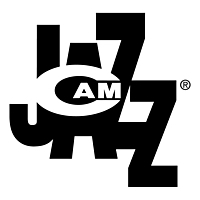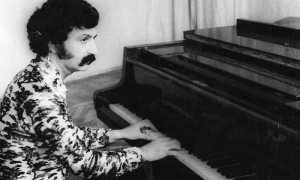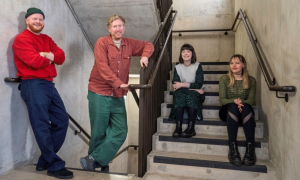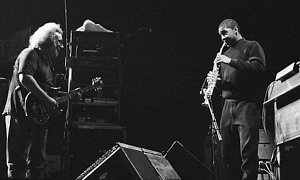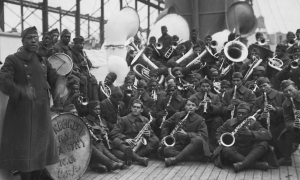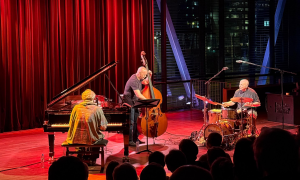Home » Jazz Articles » Profile » Moving On Music: Literal Magic
Moving On Music: Literal Magic

Courtesy Moving On Music
That was always one of the aims, the artistic aim, to bring challenging music that wouldn't otherwise be here, basically. That was my ethos.
—Brian Carson, Founder of Moving On Music
Jazz, traditional Irish, folk, electronic, contemporary classical, indie-rock, choral... and plenty that slips between the ever-widening genre cracks. Moving On Music has got it all covered
In The Beginning: On The Shoulders Of Brian Carson
MOM is synonymous with Brian Carson, who founded the Belfast-based music promotion organisation in 1995. His dedication to music, and to the musicians, has been unwavering. You could always trust MOM under Carson's stewardship to deliver world class music to Belfast, especially during the annual Belfast Festival At Queens (BFAQ).For five years prior to MOM, Carson promoted music through Project Jazz. One of its early gigs was the trio of Bill Frisell, Paul Motian and Joe Lovano at The Crescent Arts Centre: "Jazz and improvised music was my particular interest," Carson says, moving quickly to acknowledge the support of Peter Jupp in the early days. Jupp, a history professor at Queen's University, was the BFAQ's jazz programmer from 1972 to 1988. "Peter Jupp was very, very helpful to me at the start of trying to promote music in Belfast during the times of the Irish conflict."
For years, first through Project Jazz and then via its successor organisation MOM, Carson steered programming of the BFAQ's Guinness Spot, a festival within the festival, sponsored by the company that brews Ireland's famous stout.
Those old adverts that said Guinness is good for you were no word of lie.
The Guinness Spot would feature top names in jazz and world music such as Betty Carter, John Scofield, numerous small ensembles of Dave Holland, a duo of Andrew Hill & David Murray, Sheila Jordan, Steve Lacey, Nikki Iles and Tina May, Jazz Jamaica All-Stars, Art Ensemble Of Chicago, Geri Allen, Tomasz Stańko, Carol Kidd, tango maestro Dino Saluzzi, and Orchestra Baobab, among many other big names.
"That was always one of the aims, the artistic aim," Carson explains, "to bring challenging music that wouldn't otherwise be here, basically. That was my ethos."
And Carson has certainly delivered. Who else but MOM would conceive of pairing Ornette Coleman with Irish traditional musicians? Coleman's "Belfast Suite" premiered in the Whitla Hall, Belfast, in 2000. Musically, it may not have entirely convinced everyone, but sure, was a bold and brilliant idea not worth a stab? Those were the days...
Carson's advocacy of less mainstream music for forty-odd years has been a service to the city of Belfast itself. For without a vibrant cultural agenda any city is deeply impoverished, its citizens robbed. And Belfast, more than most cities, has desperately needed the lifeblood of the arts to help to drag it out of the abyss of decades of sectarian division, isolation and economic stagnation.
After twenty-five years of promoting music, much of it jazz and improvised music, Carson indulged his passion and founded a jazz festival. From the very start, MOM promoted jazz. Carson could speak with undiminished enthusiasm for hours about many of the gigs he brought to Belfast: Sun Ra Arkestra; Peter Brötzmann; Han Bennink; Ingrid Laubrock; Louis Moholo-Moholo; Claire Martin; Sidsel Endresen... suffice it to say, the list is a long one.
Brilliant Corners, named after Thelonious Monk's 1957 album on the Riverside label, launched in 2013. Initially a three-day event featuring predominantly Irish and UK artists, Brilliant Corners has since expanded to an eight-day celebration offering wider European and American perspectives on the music. It is the flagship event in MOM's musical calendar.
Carson stepped quietly away from MOM with remarkably little fanfare around the time of COVID, a departure that had been carefully thought through as part of a three-year succession plan. "That was very important. It was the main aim," he emphasizes. Carson remains active in programming and promoting music, particularly through Belfast's biennial Sonorities Festival. Importantly, he has left MOM in very sure and capable hands.
The Team, The Brand
Michael Bonner, MOM's Creative Producer, joined in 2013. He is quick to recognize Carson's legacy. "He created MOM more or less from nothing. He did it for 25 years. That's impressive. The way he goes about programming, and his appetite for music has been passed on to us. I worked alongside him for seven years and he was extremely generous with his time and approach. We see Brian at most of our gigs and we work with the Sonorities Festival, so we still have a creative relationship with Brian. He's a very good friend too."Paula McColl, who joined MOM as a volunteer in 2012, (soon meriting a full-time job) carries the title of Creative Producer. Mark Reid—who started in the summer of 2021—is Outreach and Production. Ríonach O'Donnell who came on board in June 2024, is Events and Administration.
The titles suggest very specific roles, but the daily realities of promoting gigs and tours year-round demand an all-hands-to-the-pumps flexibility, as Bonner explains: "I think it's like probably most small arts organisations where you have a job title in theory, but actually the work is usually much broader. We have specialist areas for sure, but then there's a whole big workload where it's just about mucking in."
In its first 30 years MOM has promoted thousands of gigs. Uniquely, perhaps, for music promoters, MOM offers an informal money-back guarantee, so confident is the team in the quality of the music on offer. In all these years there has never been a customer wanting a refund.
As McColl explains, MOM's purview is much broader than simply promoting gigs. "It's also about developing audiences, providing opportunities for artists to come here who might not tour here otherwise—particularly through the touring program—and providing opportunities for local artists to develop their careers and skills."
Audience development is something both strategic—bringing the music to different parts of the city—and organic. "We have a very regular, loyal audience," says McColl. "We know a lot of them by name, and they're at all of the gigs. That's something that's a bit special about Moving On Music gigs—that loyal audience following. We all put in a lot of time to talk to people who come along. Even if they're new, you're always trying to build a rapport with people."
That personal touch makes any MOM gig a welcoming environment, but at the end of the day people come for the music. And as McColl explains, they often come without knowing what they are going to hear. "Even at the gig last weekend, I was talking to a guy in the bar who said he might not know what the gig is or who the artist is, but if it's a Moving On Music gig, he'll go, because he trusts the brand. So I guess it's just maintaining the quality of our output, so that people can build that trust over time, and hope that people take a chance on what we do."
Bonner concurs. "We focus more on the actual night, the music on stage, and the people who are in the room and make sure it's special. That does the heavy lifting for the next time you put something on. That's our approach. Not the activity outside the room and away from the music—sales initiatives, taking out ads, gimmicks and so on. We're trying to make deep connections with people who come to our gigs. It's music first."
Houses Of The Holy
A larger proportion of MOM's gigs (and the Brilliant Corners festival) take place in Black Box, an intimate arts venue in the heart of Belfast's Cathedral Quarter. "We work with Black Box a lot because it suits lots of our music, it's a good size, and they're a great team to work with. But we also partner lots of other venues," explains Bonner."We're keen to have our music in the most suitable space, so we'll use all kinds of venues," Bonner adds. "We're always open to using new spaces and working with new people."
One venue that MOM have been using more frequently is the American Bar in Sailortown, the old docks area of Belfast. "It's quite a small space, but there's something really magic about a rammed 60-capacity room, rather than 60 people in a space that can hold 200. It's like sardines in a can up there, but in a good way," says Bonner.
In a city whose geography can be mapped along political and religious lines, Moving On Music's go-to venues can bring people to parts of town they might otherwise never frequent. "We're not afraid of stepping out of the small radius of the Cathedral Quarter. The venues we use cover a geographical spread," says Reid. "I mean, Duncairn wasn't really on my radar until I started working here, and it's an absolute gem. It's a really well-run community-focused organization. It's such an asset to North Belfast and I think it's really good that we work with them."
Country Roads: MOM On Tour
However, not everyone in the country can rock up to Belfast for a gig, so several times a year MOM tours artists to towns big and small. McColl explains: "We do a couple of different types of tours. We have our touring program that runs across the north. We're funded by the Arts Council, and we typically partner with all of the council venues and art centers, along with a few independent promoters. We do about four or five of those a year, depending. They're typically small scale, like maybe quartet max."These tours are fairly representative of the range of genres that MOM would usually present in Belfast, though McColl acknowledges that they tend to be more mainstream. "We typically wouldn't put something that's as experimental just because it's just a little bit harder to get the audiences in certain places. I enjoy working with the partners that we have and going out to the venues and seeing how the audiences can develop in those areas for certain types of music. And also just being able to add something a little bit more diverse to their music programme, because a lot of them usually wouldn't have certain types of music otherwise."
MOM also does island-wide tours with the assistance of the North-South Touring Fund and Beyond Borders. "We've put together a couple of large-scale tours," McColl expands. "We had Brian Irvine's ensemble on a UK-wide tour. They are always a challenge in terms of the logistics of getting such a large ensemble out on the road, but the rewards are good because you're getting to tour something that's a wee bit more contemporary, a bit more experimental. Typically it's new music."
Keeping It Real: Middle Aisle & Collaborations
Promotion of local artists has always been one of the pillars of MOM's operations. Central to this philosophy is MOM's Middle Aisle, an agency and developmental project run principally by Reid. "It is not really a traditional booking agency—we look after about a dozen acts on the island of Ireland; both securing bookings and helping them develop as artists," he clarifies. "We seek out opportunities for them, look after the logistics and are keen to provide advice or act as a sounding-board."The agency came into being during the strange time that was COVID, when there was time to thrash out ideas. "Middle Aisle came about because we had run a few artist development programs and then found that after a year, or whenever you finish working with artists, it kind of felt like they were falling off a cliff because there wasn't an established support network here. So we thought an agency and developmental program—always hand in hand—was probably a more long-term way of working with artists." says Bonner.
Reid continues: "We're trying to forge a network that's maybe a little outside of traditional funding structures. I'm keen to align with DIY scenes, little pockets that are happening here and there that will, I would say, continue to exist regardless. I think now people around the island are sort of tapping into what Middle Aisle does. We're actually starting to forge really good connections around the island in terms of that."
MOM has long collaborated with other promoters throughout Ireland, notably Improvised Music Company, (IMC) and Music Network. "We chat to them regularly," says McColl. "They have similar touring programs so we're always in touch with programming ideas to see if it ties up."
One of MOM's most spectacular collaborations with IMC has been BAN BAM, a biannual commission and development program for Irish-born (or resident) female and gender-minority composers. The award program, which in addition to a grant, offers performance opportunities and career development, grew out of IMC's one-day BAN BAM festival-cum-conference in Dublin in 2017—an initiative designed to address gender imbalance in music.
The 2021 launch of the collaborative iteration of BAN BAM provided a platform for three of the island's finest musicians/composers in singer Sue Rynhart (see album review here ), harpist/sound artist Úna Monaghan and improvising violinist/violist Cora Venus Lunny (see album review here ).
In 2024, BAN BAM offered an unforgettable triple bill of pianist Carole Nelson's trio, composer/pianist and percussionist Bianca Gannon's ensemble, and saxophonist Meilana Gillard's RBG Trio. Gigs won over audiences in Dublin, Belfast (see review here), and at the Vortex Jazz Club during the EFG London Jazz Festival.
MOM has also developed working ties with independent Dublin promoters such as Enthusiastic Eunuch Promotions and Foggy Notions—likeminded purveyors of wonderfully eclectic music.
"In the past three or four years we've probably expanded and have stronger relationships on the whole island than we've ever had," affirms Bonner. "Just with the work Middle Aisle does, we have more activity on the whole island than we've ever had. We're definitely an Island-wide company."
Reid nods in agreement. "We obviously have really good partnerships with other promoters up here (in the North) as well. We know what works for us and I think we understand the dynamic here, the landscape... So, yeah, I think it's healthy."
Brilliant Corners: A Festival Of Jazz In Belfast
The jewel in the crown of MOM's programming is the Brilliant Corners jazz festival. The jazz scene in Northern Ireland is small so a jazz festival, in hindsight, seems like a brave move. In fact, most of the pieces of the jigsaw were already in place for years prior. "Brian was actually doing a jazz festival of sorts, but was called the Moving On Music Festival," Bonner relates. "I remember myself and Brian chatting and I'd asked why it wasn't called a jazz festival explicitly. I think maybe there was a worry about calling something a jazz festival makes it sound too grandiose... or exclusive. Or depending on who you talk to, too stuffy, too cool, too uncool, you know? It's a loaded term."From the get-go, Brilliant Corners has featured jazz in all its myriad incarnations. From bebop and hard-bop small ensembles to free-improvisers, from vocal jazz to hip-hop-inflected jazz, from conventional ( and much less conventional) big-band jazz to electronic-filtered jazz, from punk-jazz to John Coltrane and Ornette Coleman tributes, from math-jazz to metal-jazz, from blues to jazz-funk, from Afro-futurism/spiritual jazz to early New Orleans jazz, from ethno-jazz to astral jazz, from the arch and abstract to the danceable...
"It's a broad church," says Bonner. "As wide as we can make it. If it's progressive, exciting and interesting we'll stick it in. It's kind of stretching the idea of what a genre is, or what it can be. Having a jazz festival allows you to put on stuff that you can't really do as a one-off throughout the year, because if you did you'd have 30 or 40 people going to it. If you put on something like that in a festival, people go to it. They take a risk."
Though O'Donnell is on MOM's side of the fence, she was perhaps typical of many of the punters who rock up to Brilliant Corners for a week's fix of broad-spectrum jazz. Enticed as they are by the generously priced all-in ticket price, many are unsure of quite what to expect. "I definitely like jazz a lot more than I thought I did, because there's so many different types of jazz, and that's something that I probably wouldn't have realized on my own if I wasn't in this office," O'Donnell admits. "I would say I have a very diverse music taste. Well, I thought I did before coming to Moving On Music..."
Over the years Brilliant Corners has been highly supportive of Irish jazz artists, both established and up-and-coming. Since 2020, the Ulster Youth Jazz Orchestra, a 23-piece big band, has been a fixed feature of the festival program. "The Ulster Youth Jazz Orchestra is something we always really enjoy doing and supporting. I think Ken Jordan previously and Paul O'Reilly (past and current musical directors) are really doing good work with the young musicians and it's good to give them a platform in the festival, for sure."
The UYJO's traditional Saturday afternoon slot packs out Black Box every year. For Brilliant Corner's 13th edition the UYJO gig will be held in the larger auditorium of the Metropolitan Arts Centre (The MAC), which is also home to MOM's office. "Every year we find that the amount of people wanting to go to the Ulster Youth Jazz Orchestra gig and support their loved ones who are playing music just gets bigger."
What Price The Arts?
MOM's main funders are the Arts Council of Northern Ireland and the National Lottery, with further support from Belfast City Council and the PRS Foundation. The bigger picture, however, is not too rosy. Figures for 2023 indicate that per capita expenditure on culture in Northern Ireland is around £5, a miserly figure compared to figure of approximately £22 per capita in the Republic of Ireland.Given the drastic cuts in investment in the arts in Northern Ireland since the turn of the century, it is remarkable how MOM have managed to consistently promote such quality gigs and festivals. It is a precarious business. "We make it work. We're well thought of with our core funders, we do good work" says Bonner, "but yeah, you just never know."
One can only conclude that the people who make the key decisions when it comes to funding the arts in Northern Ireland have little true appreciation of the arts, little understanding of the transformative power of music and the arts in general.
One man who does understand is musical polymath Brian Irvine. During his memorable performance at Brilliant Corners 2018, Irvine made an impassioned plea for a reversal in the trend for plummeting funding of the arts in Northern Ireland. To raucous approval Irvine said: "Music is way of communicating, it's a way of sharing what it's like to be a human being. It changes people. It changes societies. It makes people have hope, vision and inspiration—all those things that make you feel good about life and breathing. That's why it's so, so important that we don't reduce the arts funding—we triple it."
The Power Of Music
The MOM four are music lovers first and foremost. They understand the potentially transformative power of music—emotionally, artistically and even professionally—and that makes them great music advocates.McColl, a fiddle player, recalls the impact of one of the first gigs she saw—the Anglo-Irish folk band Flook, in Armagh: "I was in my early teens just learning trad music, and I hadn't heard anything like that before. It totally changed my trajectory in terms of interest in traditional music. But it could be a workshop, it could be a masterclass," she adds. "I think there's so many ways where music can affect you, even if you're not a musician. You can get something really special from being in a unique concert setting."
Bonner agrees; "You can go to a gig with one frame of mind and come out the other side completely changed. You can go into something down the dumps and come out the other side uplifted. It can soothe, reshape, and untangle our brains. It's literal magic."
For O'Donnell, the magic happens when a band and an audience really connect to create a special vibe that is difficult to encounter elsewhere. Reid knows he has seen a great gig when words fail him.
Music then, appears to be something felt more than heard, something processed emotionally and cognitively rather than passively received, and something experienced collectively, in more ways than one. Bonner sums it up fairly succinctly: "Whenever you're at one of those gigs with your mates, you have this shared memory of something. It is life changing."
Might there be even a small celebration to mark MOM's milestone anniversary? "30 years of promoting really hard to sell music," reflects Bonner, "I mean, that's kind of worth celebrating, for sure."
Tags
Comments
PREVIOUS / NEXT
Stephen Davis Concerts
Support All About Jazz
 All About Jazz has been a pillar of jazz since 1995, championing it as an art form and, more importantly, supporting the musicians who make it. Our enduring commitment has made "AAJ" one of the most culturally important websites of its kind, read by hundreds of thousands of fans, musicians and industry figures every month.
All About Jazz has been a pillar of jazz since 1995, championing it as an art form and, more importantly, supporting the musicians who make it. Our enduring commitment has made "AAJ" one of the most culturally important websites of its kind, read by hundreds of thousands of fans, musicians and industry figures every month.









